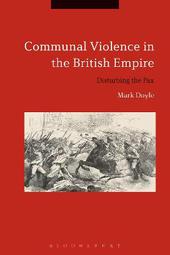
|
Communal Violence in the British Empire: Disturbing the Pax
Hardback
Main Details
| Title |
Communal Violence in the British Empire: Disturbing the Pax
|
| Authors and Contributors |
By (author) Mark Doyle
|
| Physical Properties |
| Format:Hardback | | Pages:304 | | Dimensions(mm): Height 234,Width 156 |
|
| Category/Genre | World history |
|---|
| ISBN/Barcode |
9781474268257
|
| Classifications | Dewey:909.0971241 |
|---|
| Audience | | Tertiary Education (US: College) | |
|---|
| Illustrations |
6 bw illus
|
|
Publishing Details |
| Publisher |
Bloomsbury Publishing PLC
|
| Imprint |
Bloomsbury Academic
|
| Publication Date |
11 August 2016 |
| Publication Country |
United Kingdom
|
Description
Joint winner of the North American Conference on British Studies 2017 Stansky Book Prize for the best book on British Studies since 1800 Communal Violence in the British Empire focuses on how Britons interpreted, policed, and sometimes fostered violence between different ethnic and religious communities in the empire. It also asks what these outbreaks meant for the power and prestige of Britain among subject populations. Alternating between chapters of engaging narrative and chapters of careful, cross-colonial analysis, Mark Doyle uses outbreaks of communal violence in Ireland, the West Indies, and South Asia to uncover the inner workings of British imperialism: it's guiding assumptions, its mechanisms of control, its impact, and its limitations. He explains how Britons used communal violence to justify the imperial project even as that project was creating the conditions for more violence. Above all, this book demonstrates how communal violence exposed the limits of British power and, in time, helped lay the groundwork for the empire's collapse. This book shows how violence, and the British state's handling thereof, was a fundamental part of the imperial experience for colonizer and colonized alike. It offers a new perspective on the workings of empire that will be of interest to any student of imperial or world history.
Author Biography
Mark Doyle is Associate Professor of History at Middle Tennessee State University, USA. He is the author of Fighting the Devil for the Sake of God: Protestants, Catholics and the Origins of Violence in Victorian Belfast (2009).
ReviewsMark Doyle's Communal Violence in the British Empire: Disturbing the Pax is an insightful book, as much for its methods as for the arguments and evidence it musters ... he wants us to think more carefully about the ways in which liberal imperial ideology worked to sponsor the kind of unrest that, in turn, threw British supremacy into question. * Victorian Studies * Doyle's book is useful and original in focusing on specific instances of communal conflict and state response. Vivid and closely-grained studies ... alternate with analytical chapters assessing the strategies and failures of British authorities. * Cercles * Thoroughly researched and engagingly written, this book draws together the local and imperial in impressive ways. Doyle masterfully explores the details of riots from the West Indies to Ireland to India, and demonstrates the ways in which these riots and the state's response fused communalism and nationalism to ultimately corrode the authority of the British Empire. By identifying and analyzing broader themes present in a variety of communal riots, this book provides a valuable contribution to our understanding of the intersections between internal violence and the imperial experience. * Jill C. Bender, University of North Carolina at Greensboro, USA, author of The 1857 Indian Uprising and the British Empire * Treating communal disorder as a distinct analytical field, Mark Doyle's comparative approach to the causes and effects of riots in the Victorian Empire is consistently insightful. Communal violence in the Indian sub-continent, British Guiana, and Ireland - the three cases that Doyle examines - profoundly reshaped ideas of authority and attachment, at same time highlighting the hypocrisies of imperialist claims of benevolent modernisation. * Martin Thomas, University of Exeter, UK * An insightful book, as much for its method as for the arguments and evidence it musters ... Doyle has given us a welcome opportunity to head back into the archives and follow his provocations wherever they may lead. * Victorian Studies *
|